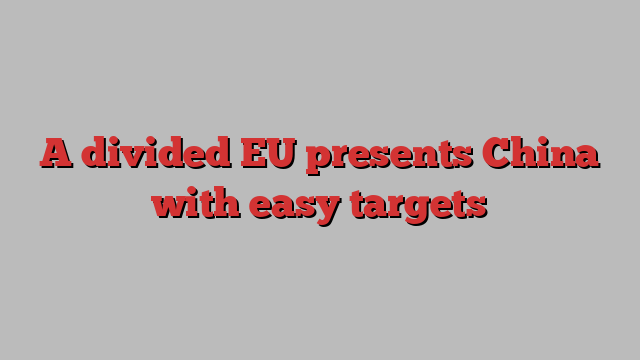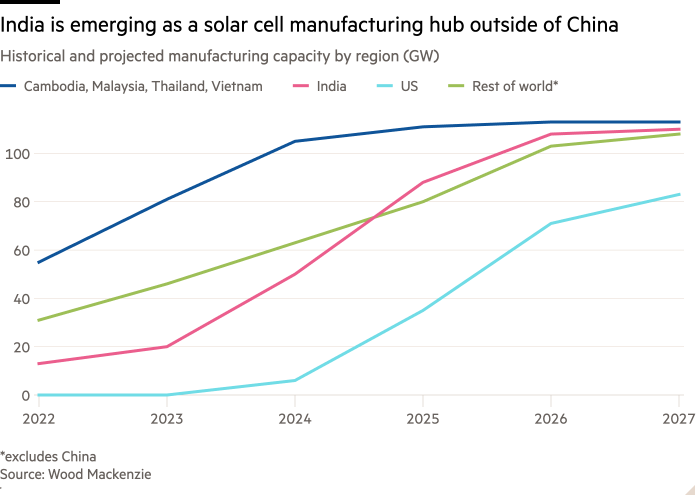
This article is an on-site version of our Trade Secrets newsletter. Premium subscribers can sign up here to get the newsletter delivered every Monday. Standard subscribers can upgrade to Premium here, or explore all FT newsletters
Welcome to Trade Secrets. In today’s main pieces we look at the EU’s disjointed decision to put anti-subsidy tariffs on electric vehicles from China, plus an announcement to push back the similarly fraught implementation of the deforestation regulation. I also report on the reader feedback I got to my piece about freeports a couple of weeks back.
Charted Waters is on India’s growing prowess in manufacturing solar cells. Your question of the week: I’ve always been sceptical that the US and EU can join forces with a common policy towards China on EVs or any other green tech, but do you have an idea of how it might be made to work? Answers to [email protected].
Get in touch. Email me at [email protected]
EV come, EV go
“The last temptation is the greatest treason”, says a character in TS Eliot’s Murder in the Cathedral, “to do the right deed for the wrong reason.” I must say “greatest treason” seems harsh, I can think of worse, but it’s a lovely couplet and it serves my purpose here, so I’m going to run with it.
Contested votes on trade defence measures in the EU are never a thing of elegance and beauty, but last week’s decision by the member states to go ahead with the European Commission’s proposed anti-subsidy duties on Chinese electric vehicles was particularly messy. Chief culprit was Germany, which abstained on an advisory vote over the summer before leading the failed charge against the tariffs in the final decision.
We’ve seen conflict before in similar circumstances, also with green tech. There was a fraught internal EU dispute over solar panels in 2012-13, with Germany again pulling the rug from under the commission by opposing antidumping tariffs, successfully on that occasion.
The “right thing for the wrong reason” aspect is that Germany clearly didn’t vote against EV duties out of free-trade principle, but for fear of retaliation, in particular against its car companies wanting to squeeze just a few more sales of their large-engined petrol cars out of the Chinese market. German car companies have of course traditionally wielded so much power over EU trade policy you might as well have declared them a separate member state and have done with it. But in this case they’re on the wrong side of history, or at least of environmental progress.
Before you all start writing in, I do recognise there is a not entirely unreasonable political economy argument to be made for temporary tariffs to ease the transition, so “right thing” can legitimately be debated. But I digress.
Although it won’t enjoy the tariffs, China must at least be eyeing this public display of disarray with satisfaction, like a predatory cat watching a gang of disorganised mice running around crashing into each other and falling over. As Sam Lowe points out here, the next stage of the game is member states competing to attract Chinese EV manufacturers to locate production in their country.
The aim is to attract real value-added manufacturing, not just Potemkin final-assembly plants designed illicitly to circumvent the tariffs with most of the jobs and profits staying in China. But looking at this disunited lot, can you really believe they’re going to take firm collective action against such circumvention? Hard to envisage.
This all underlines, by the way, why transatlantic co-operation over EVs with China has always been illusory. As I wrote in last week’s column, the US wants an isolated market dominated by local producers with China kept out, and if that means expensive clunky EVs that nobody buys and hence more carbon emissions, so be it. The EU on the whole supports admitting Chinese imports and FDI for reasons good (the environment, consumers) and bad (selling gas-guzzlers in China), but it’s a policy that’s emerged from disparate member states which resist co-ordination. There’s really no basis for a common approach.
Deforestation procrastination
Speaking of the right thing for the wrong reason, last week’s other EU drama was the implementation of the deforestation regulation (EUDR) being delayed for a year for large companies and 18 months for small ones. To be clear, the actual legislation remains in place but it won’t be applied until 2026. The EU is of course a firmly rules-based institution — as long as it gets to say when and whether it will follow the rules.
Delay is probably the right thing because, as I’ve been warning since before it was cool, the EUDR was badly designed and implemented, with inadequate attention given to how compliance would look on the ground. World Trade Organization director-general Ngozi Okonjo-Iweala said as much in an FT interview last month, giving a nice example about farmers in her native Nigeria.
In this case, though, these design flaws have been leapt on by politicians, particularly from the centre-right European People’s party (EPP) grouping, who want to push back more generally against green policies. (Let’s be honest: their objections to the EUDR have more to do with the regulatory burden on European agriculture and forestry than the travails of foreign farmers.)
The commission really needs to fix those problems fast if it wants to stop the resistance against environmental regulation gathering pace. Green principles aren’t enough: it also needs competent management.
Freeports schmeeports: reader feedback
Two weeks ago, following news of the feeble take-up of customs privileges in the freeports created by the last Conservative government (a personal obsession of former prime minister Rishi Sunak) I asked you what you thought in general of freeports, special economic zones and so on. The results were strongly negative: “outdated”, “distraction” and “shady” were among the politer words used.
My favourite response, from a longtime reader: “Of course they were rubbish — otherwise why were the seven that were opened in 1984 closed by [David] Cameron in 2012? Just a bee in Rishi’s bonnet. And it’s not as if there weren’t plenty of people pointing out all the drawbacks.”
There were indeed: I was one of them. And I think I’ll leave this here.
Charted waters
India’s long-held desire to snaffle some of the manufacturing business from the higher-cost and politically risky China has had some success in at least one area: it’s sharply increased its manufacturing of solar cells.

Trade links
Trade Secrets is edited by Harvey Nriapia
Recommended newsletters for you
Chris Giles on Central Banks — Vital news and views on what central banks are thinking, inflation, interest rates and money. Sign up here
Europe Express — Your essential guide to what matters in Europe today. Sign up here